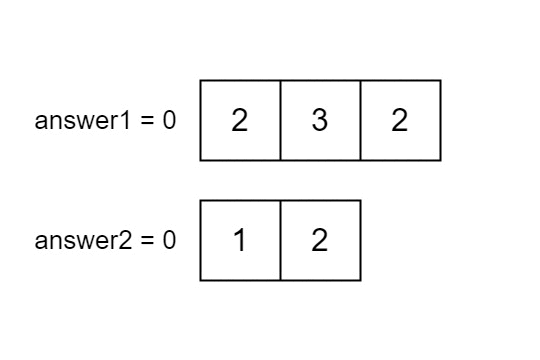2956. Find Common Elements Between Two Arrays
Description
You are given two integer arrays nums1 and nums2 of sizes n and m, respectively. Calculate the following values:
answer1: the number of indicesisuch thatnums1[i]exists innums2.answer2: the number of indicesisuch thatnums2[i]exists innums1.
Return [answer1,answer2].
Example 1:
Example 2:
Input: nums1 = [4,3,2,3,1], nums2 = [2,2,5,2,3,6]
Output: [3,4]
Explanation:
The elements at indices 1, 2, and 3 in nums1 exist in nums2 as well. So answer1 is 3.
The elements at indices 0, 1, 3, and 4 in nums2 exist in nums1. So answer2 is 4.
Example 3:
Input: nums1 = [3,4,2,3], nums2 = [1,5]
Output: [0,0]
Explanation:
No numbers are common between nums1 and nums2, so answer is [0,0].
Constraints:
n == nums1.lengthm == nums2.length1 <= n, m <= 1001 <= nums1[i], nums2[i] <= 100
Solutions
Solution 1: Hash Table or Array
We can use two hash tables or arrays \(s1\) and \(s2\) to record the elements that appear in the two arrays respectively.
Next, we create an array \(ans\) of length \(2\), where \(ans[0]\) represents the number of elements in \(nums1\) that appear in \(s2\), and \(ans[1]\) represents the number of elements in \(nums2\) that appear in \(s1\).
Then, we traverse each element \(x\) in the array \(nums1\). If \(x\) has appeared in \(s2\), we increment \(ans[0]\). After that, we traverse each element \(x\) in the array \(nums2\). If \(x\) has appeared in \(s1\), we increment \(ans[1]\).
Finally, we return the array \(ans\).
The time complexity is \(O(n + m)\), and the space complexity is \(O(n + m)\). Here, \(n\) and \(m\) are the lengths of the arrays \(nums1\) and \(nums2\) respectively.
1 2 3 4 | |
1 2 3 4 5 6 7 8 9 10 11 12 13 14 15 16 17 18 19 20 | |
1 2 3 4 5 6 7 8 9 10 11 12 13 14 15 16 17 18 19 20 21 | |
1 2 3 4 5 6 7 8 9 10 11 12 13 14 15 16 17 18 | |
1 2 3 4 5 6 7 8 9 10 11 12 13 14 15 16 17 18 | |



